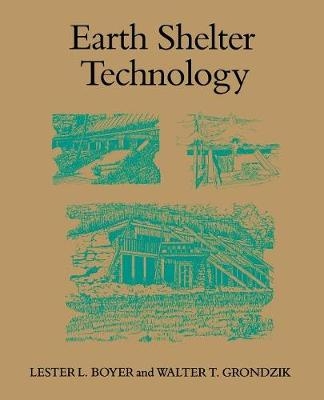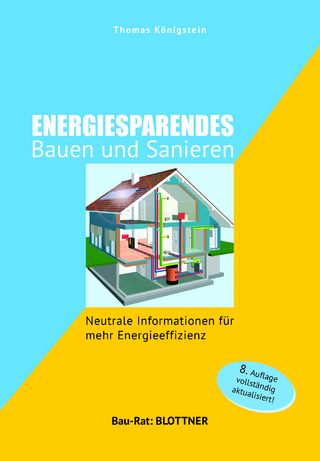
Earth Shelter Technology
Seiten
1987
Texas A & M University Press (Verlag)
978-0-89096-302-9 (ISBN)
Texas A & M University Press (Verlag)
978-0-89096-302-9 (ISBN)
As early as the 1960s innovative builders were beginning to design and construct underground and earth-covered houses. At first this different approach to house building was simply an outgrowth of the search for alternative life-styles, but since the energy shortages of the seventies, many homeowners have rekindled their interest in earth-sheltered dwellings for the energy savings they afford.
This book has been written in response to the continuing need for information on earth shelters. Though many books on these new buildings have appeared in recent years, most of them have been "how-to" books--many of them long on photographs and short on detailed discussion of the basic variables that play a most important role in the success of the designs. This volume presents a comprehensive technical view of the problems involved for building science professionals, including students of architecture, working architects, building contractors, and engineers, as well as the informed lay public.
Boyer and Grondzik discuss and interrelate such earth shelter design concepts as passive solar heating, daylighting, and hazard protection for all regions and climates, at the same time evaluating shelter performance in terms of comfort and habitability, cooling and heating effectiveness, and levels of protection. In addition, they present the proper use of various construction and waterproofing techniques in relation to climate, characteristics of the site, and other regional factors. The text encourages a system approach to design to allow the builder to achieve a house with outstanding performance.
Readers will find the list of references provided particularly useful as a guide to further study of specific design features or problems. More than 120 supporting tables, charts, and other illustrations add clarifying information to the text.
In compiling this comprehensive introduction to earth shelter design, the authors have used the evaluations provided by occupants of earth shelters, measurement and long-term studies of specific earth shelters, and various prediction models and methods as well as a thorough study of the literature on the subject. Although the text deals largely with residential applications, significant attention is also given to select nonresidential examples
This book has been written in response to the continuing need for information on earth shelters. Though many books on these new buildings have appeared in recent years, most of them have been "how-to" books--many of them long on photographs and short on detailed discussion of the basic variables that play a most important role in the success of the designs. This volume presents a comprehensive technical view of the problems involved for building science professionals, including students of architecture, working architects, building contractors, and engineers, as well as the informed lay public.
Boyer and Grondzik discuss and interrelate such earth shelter design concepts as passive solar heating, daylighting, and hazard protection for all regions and climates, at the same time evaluating shelter performance in terms of comfort and habitability, cooling and heating effectiveness, and levels of protection. In addition, they present the proper use of various construction and waterproofing techniques in relation to climate, characteristics of the site, and other regional factors. The text encourages a system approach to design to allow the builder to achieve a house with outstanding performance.
Readers will find the list of references provided particularly useful as a guide to further study of specific design features or problems. More than 120 supporting tables, charts, and other illustrations add clarifying information to the text.
In compiling this comprehensive introduction to earth shelter design, the authors have used the evaluations provided by occupants of earth shelters, measurement and long-term studies of specific earth shelters, and various prediction models and methods as well as a thorough study of the literature on the subject. Although the text deals largely with residential applications, significant attention is also given to select nonresidential examples
| Erscheint lt. Verlag | 19.2.1987 |
|---|---|
| Zusatzinfo | illustrations |
| Verlagsort | College Station |
| Sprache | englisch |
| Themenwelt | Sachbuch/Ratgeber ► Freizeit / Hobby ► Hausbau / Einrichten / Renovieren |
| Sachbuch/Ratgeber ► Freizeit / Hobby ► Heimwerken / Do it yourself | |
| Technik ► Architektur | |
| Technik ► Bauwesen | |
| ISBN-10 | 0-89096-302-9 / 0890963029 |
| ISBN-13 | 978-0-89096-302-9 / 9780890963029 |
| Zustand | Neuware |
| Haben Sie eine Frage zum Produkt? |
Mehr entdecken
aus dem Bereich
aus dem Bereich
neutrale Informationen für mehr Energieeffizienz
Buch (2024)
Blottner Verlag e.K.
29,90 €
Dekoideen im Vintage-Stil, Rezepte und Anekdoten aus dem hohen Norden
Buch | Hardcover (2023)
BusseSeewald (Verlag)
36,00 €
wie du mit deinem Garten glücklich wirst, ohne dein Konto zu plündern
Buch | Hardcover (2024)
Gräfe und Unzer (Verlag)
19,99 €


